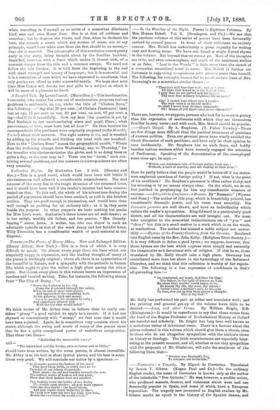-a the Watches of the Night. Poems in Eighteen Volumes.
By Mrs. Horace Dobell. Vol. X. (Remington and Co.)—We see that the previous volumes of this series of poems have been favourably noticed by several papers. In some of their criticisms we entirely concur. Mrs. Dobell has undoubtedly a great capacity for writing easy and flowing verse. We have not found a single forced rhyme in the volume. Bat beyond this we cannot go. Most of the thoughts are trite, and even commonplace, and much of the sentiment strikes us as false. "Lost in the Woods" is little more than the sketch of a somewhat sensational novel in verse. Mrs. DJbell is further un- fortunate in suggesting comparisons with greater poets than herself. The following, for example, cannot fail to recall certain lines of Mrs. Browning's on a somewhat similar theme "Therefore still fare thee well ; and as I sever All links that bound as in the days of yore, I pray that we are parted now for ever,—
Thy once dear memory brightens life no more!
Alas! I cannot hate where once I loved— Thy very voice is as an evil spell— So shall I never hear its tones unmoved— Oh ! dream of evil days—once more—farewell!"
There are, however, we suppose, persons who look for no more in poetry than the expression of sentiments with which they are themselves familiar in easy verse ; and with such, Mrs. Dobell should be popular.
Hope's Gospel. By A. Stephens. (T. Fisher De win.)—There are few things more difficult than the poetical treatment of questions of current politics. Even our greatest poets have wisely avoided the direct discussion of snob problems, and have only let their opinion be seen incidentally. Mr. Stephens has no such fears, and boldly handles various matters which have recently engaged the attention of Parliament. Speaking of the demonstration of the unemployed some time ago, he says :—
"Within, our statesmen talk of foreign policy, fresh war ; Without, a herd of starving men are waiting at their door:' Does he really believe that the people would be better off if our states- men neglected questions of foreign policy ? If not, what is the point of his antithesis ? Mr. Stephen's grammar is often rather shaky, and his meaning is by no means always clear. On the whole, we do not feel justified in prophesying for him any considerable measure of success.—Edward the Confessor: a Drama. By "Bassanio." (Wyman and Sons.)—The author of this play, which is beautifully printed, has considerable dramatic power, and his verse runs smoothly. His dramatis persona are well drawn, and have an individuality which enlists the reader's sympathies. King Edward is a particularly good sketch, and all his characteristics are well brought out. We must take exception to the somewhat indiscriminate use of "you" and " thou ;" but this is a small matter in a work which is, on the whole, so meritorious. The author has treated a noble subject not unwor- thily.—Hymns of the Present Century, from the German. Rendered into English verse by the Rev. John Kelly. (Religions Tract Society.)— It is very difficult to define a good hymn ; we suppose, however, that those hymns are the best which express most simply and earnestly the imaginative and devotional aide of religion. If this be so, those translated by Mr. Kelly should take a high place. Germany has contributed more than her share to the hymnology of the Reformed Churches, and we think that this collection is worthy of her reputa- tion. The following is a fine expression of confidence in God's all-pervading love :— "Be comforted, my heart, God lives for thee!
Thy father, in the light of heaven on high, He chose thee, are the world began to be.
He knows thy life, thy weal, thy misery ! A father's love, a mother's care, he bronght To time, e'er yet to him thou gayest a thought : This is thy God !"
Mr. Kelly has performed his part as editor and translator well ; and the printing and general get-up of the volume leave little to be desired.—Iona, and other Verses. By William Bright, D.D. (Rivingtons.) —It would be superfluous to say that these verses from the hand of the Regina Professor of Ecclesiastical History at Oxford are tasteful and scholarly. Dr. Bright has long been well known as a melodious writer of devotional verse. There is a fervour about the pieces collected in this volume which should give them a charm, even to those who do not altogether sympathise with the author's views on history or theology. The Irish reminiscences are especially inter- esting at the present moment, and all, whether or not they sympathise with the proposals of Mr. Gladstone, will echo the sentiment of the following lines, that- " Sinister was England's fate, To conquer, not assimilate."


































 Previous page
Previous page